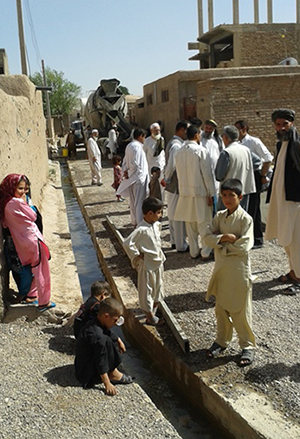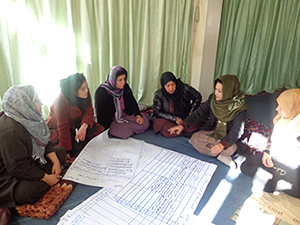Background

Afghanistan is rapidly urbanizing as can be seen in the target cities with nearly 5% annual population growth. This urban growth is an irreversible process, and due to the extreme poverty many households are living in informal settlements without access to public services. Urban poverty and social exclusion are on the rise and half of the Afghan population is expected to be living in cities by 2050. To be able to make cities functioning and capable of managing such expected rapid urban growth strengthening institutional capacity of municipal governance is essential. In response UN-Habitat helps the municipalities to improve their capacities to support local development through effective, efficient and accountable delivery of public services. In addition, UN-Habitat addresses the challenges of urban poverty with improving access to basic services and infrastructure through community empowerment.
Objective(s)
Given that municipal institutions will be at the centre of implementing municipal strategic plans and its service delivery, and promoting security of tenure in informal settlements, UN-Habitat shifts its development support from direct delivery of basic services and infrastructure to supporting local governments to deliver these essential services. This shift from stabilization to governance is in line with the desire of the Government of Afghanistan to gradually hand over the responsibilities of service delivery to local governments. The goal of the programme aims that municipalities are capable of effective, gender-responsive, fiscal sustainable and accountable delivery of public services.
Main Outputs

- • Policies and Laws on local development, decentralization and roles and responsibilities are clarified among of IDLG, MUDA and Municipalities
- • Municipalities are equipped and trained in applying principles of good governance
- • The People’s Process has been institutionalized
- • Inclusive (women, youth, vulnerable groups) Communities are organized and trained in developing, prioritizing action plans and present plans to the MAB
- • Municipal Departments have the capacity to develop infrastructure plans and technical specifications for sub-projects, and capacity of reporting and monitoring and evaluation
- • Improvement of Municipal Revenue-management System (safaie tax)
- • Municipality has the capacity to manage and spend local, national and donor funding
- • Municipalities are delivering public services
- • Communities are empowered and capable of developing and implementing action plans
Key expected achievements
- • Improved Policies: a shared vision among all key stakeholders at National, Local and Community level to strengthen the role of Municipalities to support local development
- • Increased Organisational and Human Resource Capacity at the Municipal and Community Level for Improved
- • Municipal Governance and Gender-Responsive Service Delivery
- • Municipalities are responsive to the priorities of the communities and providing sustainable public services
- Overview
- Community Development Project: National Solidarity Programme (NSP)
- Afghanistan Urban Peacebuilding Programme (AUPP)
- Future of Afghan Cities Programme (FoAC)
- Kabul Solidarity Programme Phase 2
- Community-Based Municipal Support Programme
- Kabul Solidarity Programme
- Developing Irrigation Associations for On-Farm Water Management Project
- Behaviour Change Communication
- Assessment of Options for Community Benefit Sharing for CASA-1000
- Urban Solidarity Programme
- Reintegration of Returnees and IDPs through Policy, Planning and Targeted Assistance (EU8)
- Strengthening Municipal and Community Development in Lashkar Gah – Phase III
- Peace-Building in Afghanistan through Consolidation of Community Solidarity (PACCS)
- Reintegration of Returnees and Internally Displaced Persons (IDPs) through Policy, Planning and Targeted Assistance (EC7)
- Strengthening Municipal and Community Governance in Lashkar Gah - Phase II
- Community Empowerment and Development for Peace Building
- Learning for Community Empowerment Programme (LCEP Phase 2)
- Reintegration of Returnees and IDPs through Policy, Planning and Targeted Assistance (EC6)
- Behaviour Change and Communication
- Governance and Development Support Programme in Kandahar (GDSP)
- NSP - Spinboldak and Khakrez in District of Kandahar
- Upgrading Informal Settlements in Kandahar City
- Youth Empowerment Project (YEP)
- Inter-Communal Rural Development Project (IRDP)






































